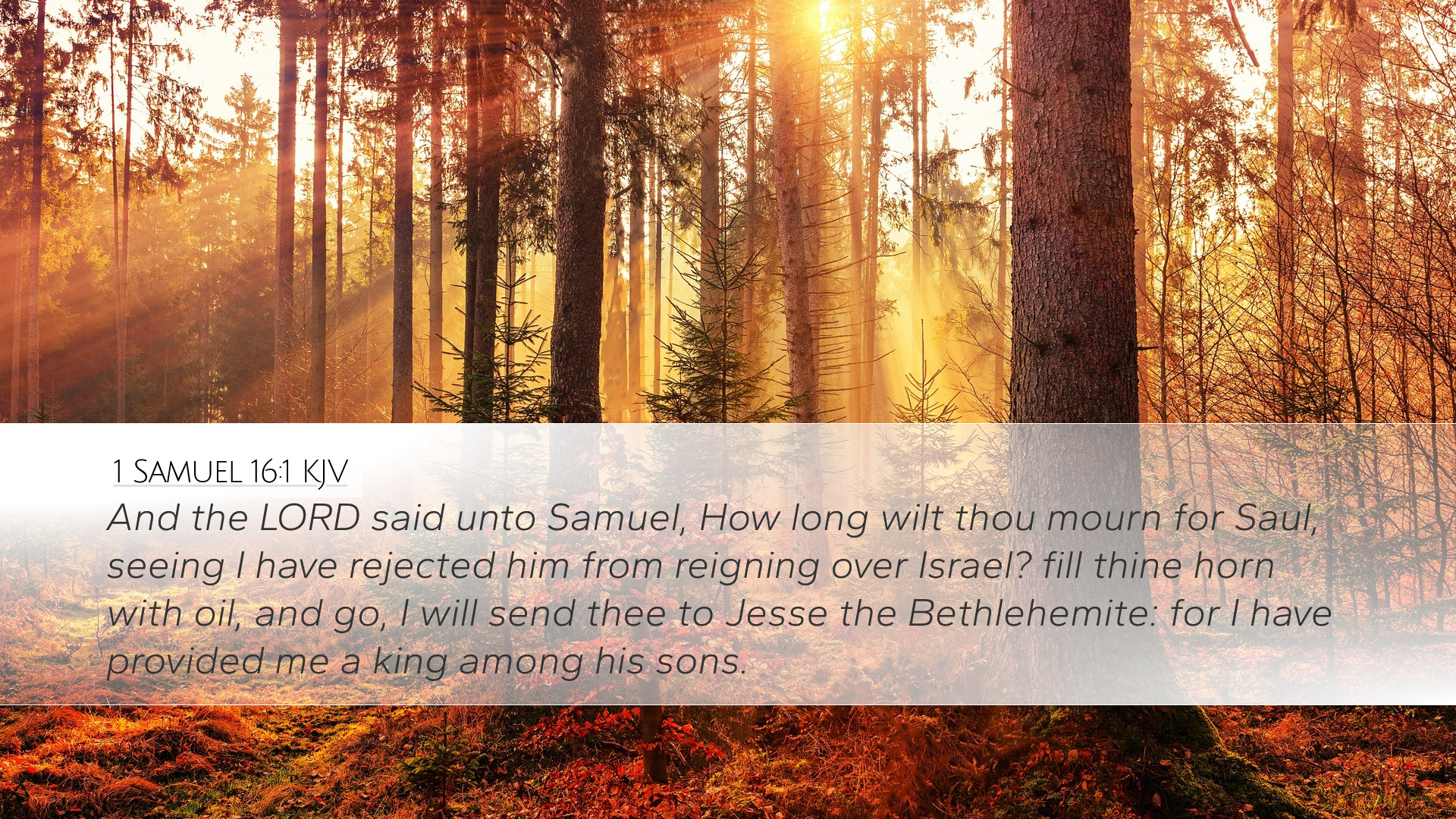Commentary on 1 Samuel 16:1
Verse Context: 1 Samuel 16:1 states: “And the LORD said unto Samuel, How long wilt thou mourn for Saul, seeing I have rejected him from reigning over Israel? fill thine horn with oil, and go; I will send thee to Jesse the Bethlehemite: for I have provided me a king among his sons.” This verse comes at a critical juncture in Israel’s history, reflecting God's sovereignty and the transition from Saul to David as king.
Insights from Commentators
Matthew Henry:
Henry emphasizes the significance of God’s communication with Samuel. He reflects on how divine revelation often comes at times of human despair. Samuel’s mourning for Saul symbolizes a deeper understanding of God’s rejection of Saul’s kingship. Henry points out that Samuel’s mourning was appropriate, yet it highlights a transition; God was moving toward His choice, David. Henry notes, “God had rejected Saul, and therefore Samuel should not mourn as if Saul was still God's chosen.” This indicates that a believer's trust in God's plan must transcend personal feelings.
Albert Barnes:
Barnes provides an analytical view of the text, focusing on the command given to Samuel to stop mourning and to prepare to anoint a new king. He notes that God’s rejection of Saul was a crucial moment not just in Saul’s life, but for Israel as a nation. Barnes remarks that God’s directive to fill the horn with oil indicates a resumption of God’s work in Israel’s governance. He elucidates, “The choice of David, a man after God’s own heart, shows God’s intent to establish a kingdom founded on righteousness and allegiance to divine will.” This moment illustrates God's sovereign control over leadership and His ability to raise up leaders according to His purposes.
Adam Clarke:
Clarke elaborates on the emotional state of Samuel, acknowledging the weight of mourning for a rejected king. He points out that despite this sorrow, God’s command to anoint another king reveals the necessity of moving forward in faith. Clarke interprets the anointing itself as a significant act of spiritual authority and prophetic importance. He states, “The oil signifies the Holy Spirit, and thus the anointing of David represents the empowerment of future leaders.” Additionally, Clarke notes the importance of Bethlehem as the birthplace of David, rooting the narrative in a specific place that later gains theological significance in the lineage of Christ.
Theological Implications
- Divine Sovereignty: The passage stresses God's control over events in Israel, highlighting that human choices do not thwart God's plans. This is a pivotal theme throughout Scripture, reinforcing the belief that God will fulfill His promises according to His timing.
- Transition of Leadership: The shift from Saul to David illustrates God's capability to choose leaders who align with His heart, demonstrating that earthly leadership is transient, subject to divine purposes and judgments.
- Call to Action: Samuel’s command to arise and anoint David reflects an important motif in the Bible: God often calls His servants to actionable faith even amid their sorrow or confusion. This encourages believers to trust and act upon God's directions, even when circumstances seem disheartening.
Application for Pastors and Scholars
This passage encourages pastors and scholars to consider how God’s providential choices in leadership extend beyond mere political structures. It serves as a reminder of the essential qualities that should characterize faithful leadership—obedience, humility, and alignment with God's heart. Pastors can draw on the narrative to remind congregants that God’s plans are often revealed through times of trial and mourning, pushing whole communities toward transformation.
Furthermore, this verse can prompt discussions around the process of discernment in leadership appointments within the church today. Scholars may find it valuable to explore the implications of divine selection, as seen in the case of David. How does this influence our understanding of servant leadership in various contexts within the modern church? The choice of David over Saul serves as a critical lesson in trusting God's judgement over human appearances.
Conclusion
1 Samuel 16:1 serves as a profound reminder of how God’s processes may diverge from human expectations. It invites believers into deeper reflection regarding loss, the nature of divine appointment, and the call to actively participate in God’s redemptive history. In today’s context, it is a vital exploration of how mourning, while necessary, is not the final word when God is at work, orchestrating new beginnings for His people.


